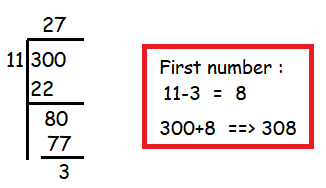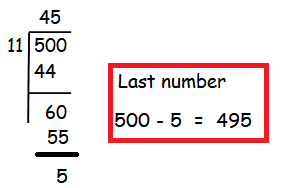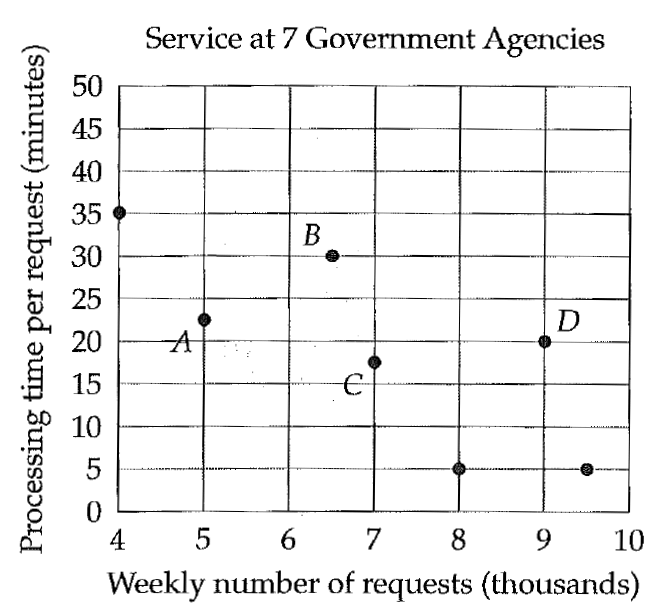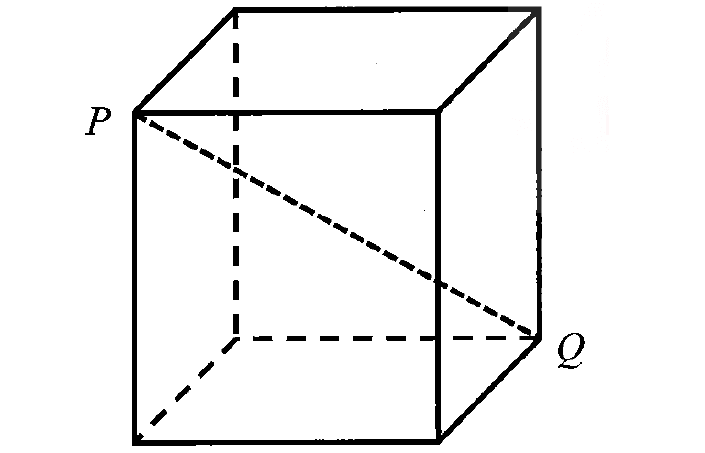FIND SUM OF NATURAL NUMBERS BETWEEN TWO NUMBERS
Question 1 :
Find the sum of all natural numbers between 300 and 500 which are divisible by 11.
Solution :
To find the first number greater than 300 and divisible by 11, we use the following shortcut.

308 + 319 + 330 +........

308 + 319 + 330 +........+495
sn = (n/2)[a+l]
n = [(l-a)/d]+1
n = [(495-308)/11]+1
n = (187/11)+1
n = 17+1
n = 18
s18 = (18/2)[308+495]
s18 = 9(803)
s18 = 7227
Question 2 :
Find the sum of all natural numbers between 100 and 200 which are not divisible by 5.
Solution :
Sum of natural numbers between 100 and 200 which are not divisible by 5.
= Sum of natural number from 100 to 200 - Sum of natural numbers which is divisible by 5 between 100 to 200.
= (100+101+...........+200)-(100+105+110+....+200)
Number of terms in the series
100+101+...........+200
n = [(200-100)/1] + 1
n = 101
Number of terms in the series
100+105+110+....+200
n = [(200-100)/5] + 1
n = 21
Sum of series 100+101+...........+200
= (101/2) (100+200)
= 101(150)
= 15150
Sum of series 100+105+110+....+200
= (21/2) (100+200)
= 21(150)
= 3150
The required sum is = 15150 - 3150
= 12000
So, the sum of natural numbers 12000.
Question 3 :
Solve 1 + 6 + 11 + 16 + .......... + x = 148
Solution :
1 + 6 + 11 + 16 + .......... + x = 148
n = [(l-a)/d] + 1
n = [(x-1)/5] + 1
n = (x+4)/5
sn = (n/2)[a+l]
148 = ((x+4)/10)(1+x)
1480 = x2+ 5x+4
x2+ 5x+4-1480 = 0
x2+ 5x-1476 = 0
(x+41)(x-36) = 0
x = 36
So, the last term is 36.
Question 4 :
Divide 144 into three parts which are in arithmetic progression and such that the largest is twice the smallest, the smallest of three numbers will be :
a) 48 b b) 36 c) 13 d) 32
Solution :
Let three numbers in arithmetic progression will be
a - d, a and a + d
Here the smallest = a - d and largest = a + d
a + d = 2(a - d) ----(1)
Sum of three terms = 144
a - d + a + a + d = 144
3a = 144
a = 144/3
a = 48
Appling the value of a in (1), we get
48 + d = 2(48 - d)
48 + d = 96 - 2d
48 - 96 = -2d - d
-48 = -3d
d = 48/3
d = 16
Smallest number = a - d
= 48 - 16
= 32
Question 5 :
If the sum of 3 arithmetic means between a and 22 is 42, then a = ?
Solution :
Let three arithmetic mean between a and 22 are a2, a3 and a4.
From the above arrangement, we know that the first term is a and 5th term is 22.
a5 = a + 4d = 22 -----(1)
Arithmetic mean of a2, a3 and a4 = 42
a + d + a + 2d + a + 3d = 42
3a + 6d = 42
Dividing by 3, we get
a + 2d = 14 ------(2)
(1) - (2)
a + 4d - a - 2d = 22 - 14
2d = 8
d = 4
Applying the value of d in (1), we get
a + 4(2) = 22
a + 8 = 22
a = 22 - 8
a = 14
So, the first term is 14.
Question 6 :
If 8th term of an arithmetic progression is 15, then sum of its 15 terms.
a) 15 b) 0 c) 225 d) 225/2
Solution :
8th term = 15
a + 7d = 15
Finding sum of 15 terms :
= (n/2) [2a + (n - 1) d]
= (15/2)[2a + (15 - 1)d]
= (15/2)[2a + 14d]
= (15/2) x 2(a + 7d)
= 15 (15)
= 225
So, the required sum is 225.
Question 7 :
If the sum of the 4th term and the 12th term of an arithmetic progression is 8, what is the sum of 15 terms of the progression ?
a) 60 b) 120 c) 110 d) 150
Solution :
4th term + 12th term = 8
a + 3d + a + 11d = 8
2a + 14d = 8
Dividing by 2, we get
a + 7d = 4 ----(1)
Finding sum of 15 terms :
= (n/2) [2a + (n - 1) d]
= (15/2)[2a + (15 - 1)d]
= (15/2)[2a + 14d]
= (15/2) x 2(a + 7d)
= 15 (4)
= 60
So, the required sum is 60.
Question 8 :
An arithmetic progression has 13 terms whose sum is 143. The third term is 5 so the first term is
a) 4 b) 7 c) 9 d) 2
Solution :
S13 = 143
a3 = 5
a + 2d = 5 ----(1)
Sn = (n/2) [a + l]
(13/2)[a + l] = 143
(13/2)[2a + (13 - 1)d] = 143
(13/2)[2a + 12d] = 143
(13/2) x 2 [a + 6d] = 143
13(a + 6d) = 143
a + 6d = 143/13
a + 6d = 11 ----(2)
(1) - (2)
2d - 6d = 5 - 11
-4d = -6
d = 3/2
Applying the value of d, we get
a + 2(3/2) = 5
a + 3 = 5
a = 5 - 3
a = 2
So, the first term is 2.
Kindly mail your feedback to v4formath@gmail.com
We always appreciate your feedback.
©All rights reserved. onlinemath4all.com
Recent Articles
-
Digital SAT Math Problems and Solutions (Part - 153)
Apr 29, 25 12:18 PM
Digital SAT Math Problems and Solutions (Part - 153) -
Digital SAT Math Problems and Solutions (Part - 152)
Apr 28, 25 11:54 AM
Digital SAT Math Problems and Solutions (Part - 152) -
Digital SAT Math Problems and Solutions (Part - 151)
Apr 26, 25 11:18 AM
Digital SAT Math Problems and Solutions (Part - 151)

